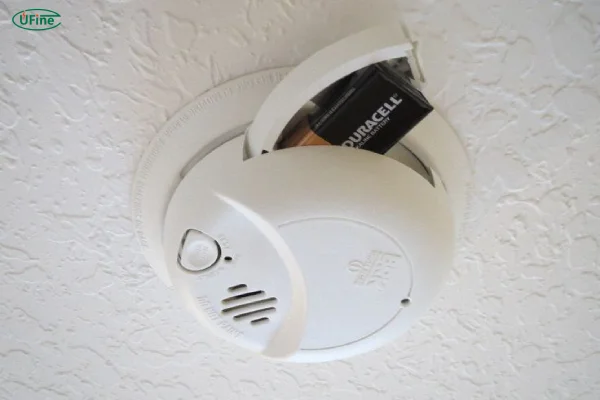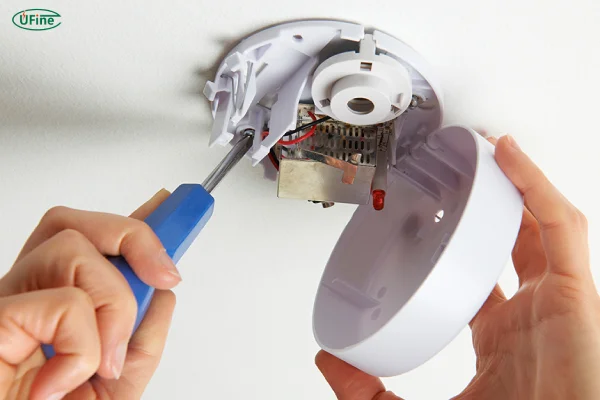Part 1. What battery does a fire detector use?
A fire detector’s battery is its lifeline, ensuring it functions reliably to alert you to potential dangers. These devices primarily use three types of batteries:
- 9V Alkaline Batteries: Common in older and basic smoke detectors. They are affordable, easy to replace, and widely available. However, they typically last about a year and need regular monitoring.
- Lithium Batteries: Found in modern fire detectors, these batteries are long-lasting—up to 10 years in some cases. They are often sealed within the unit to ensure no tampering.
- AA Alkaline Batteries: Increasingly used in newer models, these are convenient due to their availability and moderate longevity.
The choice of battery significantly impacts the performance and maintenance requirements of your fire detector. A 9V alkaline battery might suit those who prefer to replace batteries annually, while a lithium battery is ideal for long-term, hassle-free use.
Lithium VS. Alkaline Batteries: A Comprehensive Comparison

Part 2. What battery should my fire detector use?
Selecting the right battery for your fire detector is crucial for its operation. To determine the correct battery type:
- Check the Instruction Manual: Manufacturers often specify the type of battery required for optimal performance.
- Look Inside the Battery Compartment: Most fire detectors include a label indicating the recommended battery type.
- Consult the Manufacturer: If the information isn’t readily available, you can find guidelines on the company’s website or by contacting customer support.
It’s important to remember that some fire detectors come with built-in lithium batteries that last for the device’s lifetime, usually around 10 years. If your model has this feature, battery replacement isn’t necessary—just replace the entire unit once it expires.
Part 3. How long does a fire detector last?
The lifespan of a fire detector depends on its type and the battery it uses:
- Battery-Powered Models: These typically last between 7 to 10 years with regular maintenance. Batteries need replacing annually unless a long-life lithium battery is installed.
- Hardwired Fire Detectors: Connected to your home’s electrical system, these detectors rely on backup batteries in case of power outages. Their main units also last about 10 years.
Testing your fire detector monthly is vital to ensure its reliability. After a decade, replace the entire unit, even if it appears to be functioning well. This ensures up-to-date safety standards and technology.
Part 4. Fire detector battery low power signs
A low battery in a fire detector can compromise its ability to protect your home. Watch for these warning signs:
- Consistent Chirping Sound: A beeping sound every 30 to 60 seconds often indicates a low battery.
- Faint or Blinking LED Light: A dim or irregular LED signal can be a clue.
- Delayed Test Response: Pressing the test button might result in a slower or weaker alarm sound.
- No Response to Tests: If the alarm remains silent, the battery may be completely drained.
Ignoring these signs can leave your home vulnerable. Respond immediately to ensure your safety.
Part 5. How to replace the fire detector battery?
Replacing a fire detector battery might seem daunting, but it’s straightforward with the right steps:
- Gather Necessary Supplies: Ensure you have the correct replacement battery (9V, AA, or lithium, as required).
- Turn Off the Alarm: For hardwired detectors, switch off the circuit breaker.
- Remove the Detector: Twist or slide it off its mounting bracket.
- Open the Battery Compartment: This is usually located at the back or side of the detector.
- Replace the Battery: Remove the old one and insert the new one, ensuring correct alignment of the positive and negative terminals.
- Test the Detector: Press the test button to confirm proper operation.
- Reinstall the Detector: Secure it back onto the mounting bracket.
Always follow your device’s user manual for specific instructions. Regular battery replacement is a small effort that provides peace of mind.
Part 6. Fire detector troubleshooting
Even with a fresh battery, your fire detector might encounter issues. Here are some common problems and their solutions:
- Persistent Chirping After Replacement: Ensure the battery is properly installed and the contacts are clean. If the issue persists, reset the device by holding the test button for 15 seconds.
- False Alarms: Dust or debris can trigger false alarms. Gently clean the detector with a soft brush or vacuum.
- No Power: Check the battery’s orientation and the unit’s power source. For hardwired alarms, verify the circuit breaker is on.
- Random Beeping: This could indicate a malfunction. If cleaning and resetting don’t help, it may be time to replace the detector.
If problems persist, consider consulting the manufacturer or replacing the unit for peace of mind.
Part 7. Conclusion
A fire detector battery is the silent guardian of your home, ensuring safety in moments when it’s needed most. From choosing the right battery to recognizing signs of low power and performing replacements, understanding these essentials can make all the difference. Stay vigilant, maintain your fire detector regularly, and never underestimate the importance of this small yet mighty device in protecting your loved ones and your home.
Part 8. FAQs
-
Can I use rechargeable batteries in my fire detector?
Not typically. Most fire detectors are designed for alkaline or lithium batteries, as rechargeables may not provide consistent voltage. -
What happens if I ignore the low-battery warning?
Ignoring the warning risks having a non-functional detector, leaving your home vulnerable to undetected fires. -
Why does my fire detector chirp after replacing the battery?
Ensure the battery is installed correctly. If it continues, try resetting the device. -
What should I do if my detector triggers false alarms?
Clean the unit to remove dust and ensure it’s installed away from steam or cooking smoke sources. -
Are fire detector batteries universal?
No, always use the type recommended by the manufacturer for your specific model. -
How do I dispose of old fire detector batteries?
Recycle them at a designated recycling center to prevent environmental harm.
Related Tags:
More Articles

Aluminum Air Battery Design: Materials, Assembly & Efficiency Tips
An aluminum air battery uses aluminum and air to generate power. Learn its materials, assembly steps, and tips to boost energy output and efficiency.
7 Advantages of a Heated Lithium Battery in Cold Climates
Looking to power batteries in freezing temps? Heated lithium batteries excel in cold climates. Here are 7 key benefits and how they work.
How to Choose the Best Floor Scrubber Battery for Commercial Cleaning?
Selecting the ideal floor scrubber battery ensures a long runtime, rapid charging, and minimal maintenance for efficient commercial cleaning operations.
Battery for Blower vs Battery for Leaf Vacuum: Which One Should You Choose?
Battery for blower vs leaf vacuum—learn the key differences in power, fit, and runtime to choose the right battery for your outdoor tool needs.
How to Choose the Right Battery for Blower?
Choosing the right blower battery? Consider voltage, capacity, chemistry & usage. This guide helps match the best battery for peak performance.




